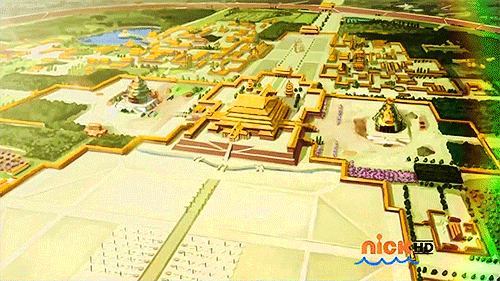
As in Aang’s time, there’s something rotten within the City of Ba Sing Se – though first we get a chance to reacquaint ourselves with the place. As it happens, a lot of what we see of the city in this episode hasn’t changed much in the generational gap between the last series and this. Built in a series of concentric circle behind a dizzyingly high wall, with a monorail system providing access in and out of various suburbs, the viewers will recognise the squalor of the outer ring gradually giving way to the green-and-gold buildings of the more upstate inner rings, culminating in the familiar opulence of the Earth King’s throne room.
Only now we have an Earth Queen.
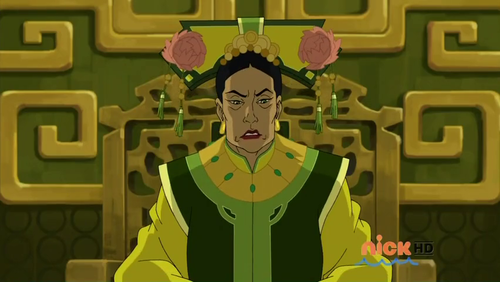
But what feminist excitement we might have gleaned from this change in management is quickly squelched when it comes to meeting Queen Hou-Ting. About as different from her mild-mannered father as you can imagine, she is instead an unpleasant blend of Long Fei’s cunning and Marie Antoinette’s (supposed) extravagance. This Queen of the Earth Kingdom is more concerned with the arrangement of her topiaries than Korra’s mission to round up stray air-benders.
There are some nice little character beats when it comes to establishing her character: savvy enough to know that Korra had turned up because she wants something, but ignorant enough to assume that the Avatar has her own servants. As it happens, the Queen also sneaks in a little world-building.
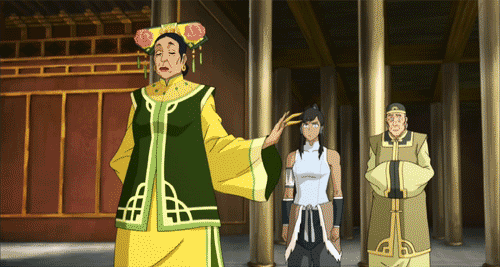
According to her, Zuko and Aang acquisitioned land from the Earth Kingdom in order to build Republic City, something that the Queen is rather displeased about. That aside, it also opens questions about what Republic City actually is – an independent city-state? I suppose it has its own President and ruling council of benders, but I don’t think the show has ever clarified the issue – another lingering side-effect of its weak first season.
Anyhoo, it’s at this point that the episode breaks into three distinct storylines, all of which unfold smoothly and are elegantly linked in the episode’s final few moments.
As part of a deal with the Queen to learn more about air-benders in the city (implied but not promised – you should have gotten that in writing, Avatar) Korra and Asami are sent to collect the Queen’s taxes from a Western-style township. The atmosphere is fraught with tension, and sure enough, the girls are waylaid by a gang of motorcyclists intent on stealing the money.
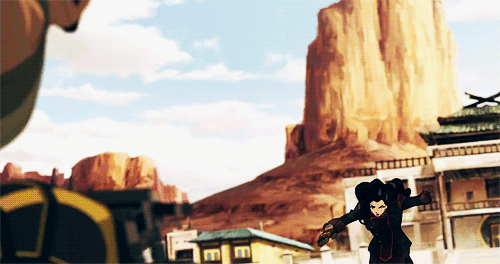
But as satisfying as it is to watch two teenage girls win in a brawl against a crew of muscly-men, Korra – knowing what she does about the Earth Queen – can’t help but feel that maybe she’s on the wrong side of this particular fight.
In an abuse of power similar to Queen Hou-Ting’s (despite being situated on the opposite end of the social stratum), Kai is using his newfound air-bending powers to distract various pedestrians with sudden gusts of wind and pick-pocket their valuables while he “helps” them reorder their clothing. Mako and Bolin have seen this type of thing a million times before, but a chase after their little thief only leaves them stranded in the lower rim with no money and no passports.
But every story has room to allow for at least one remarkable coincidence, and the brothers end up running into their cousin. Recognising their resemblance to his brother, the boys’ uncle takes them back to meet their grandmother and ... a bunch of other people who seem to cohabit her house.
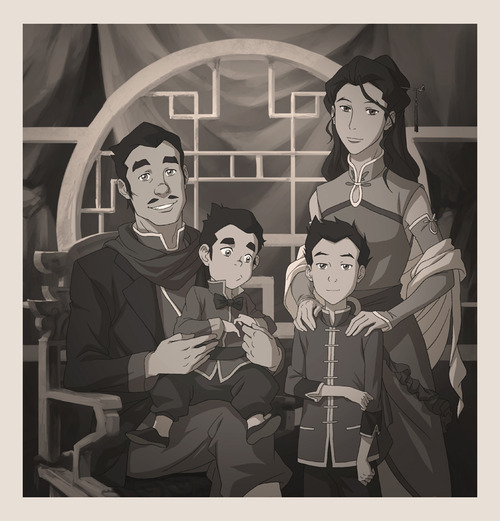
It’s reasonably touching subplot, and nicely played, but all a little bit like filler until its final moments. In sharing their mission to find air-benders with the rest of the family, Bolin and Mako hear the unsettling news that at least one air-bender who lived in the slums has since disappeared.
The tail-end of Kai’s storyline fills us in – the Dai Li are up to their usual tricks, and the new air-benders throughout the city are being abducted in order to form an air-bender army loyal to the Queen. Knowing what we do about the Dai Li, is it safe to assume that brainwashing will commence?
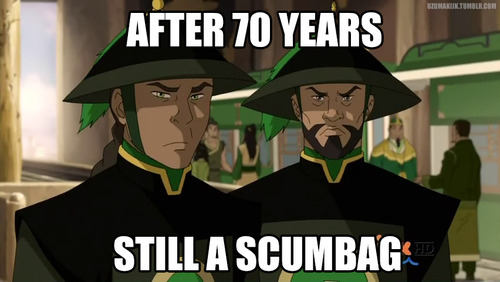
The episode built up this mini-mystery quite well by including it in all three subplots – first with Korra hearing from the Earth Queen that there are no air-benders in Ba Sing Se, secondly by Bolin and Mako’s people informing them that the supposed “non-existent” air-benders are disappearing, and finally by depicting Kai’s kidnapping and a helpfully expository villain explaining to Kai exactly why he’s been abducted.
It was an elegant way of parsing out information, though one that now places the audience a few steps ahead of what Korra and her friends know.
That leaves Zuko’s mission to the North Pole, where he plans to up the security surrounding the fourth and final member of the quartet that is getting sprung from prison one-by-one.

(source)
As it turns out, twins Desna and Eska are the current rulers of the Northern Water Tribe (who on earth thought this was a good idea??) and our final criminal is a fire-bender called P’li, whose Slasher Smile through the bars of her cage is enough to make you feel as cold as her surroundings, especially with her smug: “I’m feeling warmer already...” comment.
It’s a rich episode, one that surprised me by just how much it managed to pack into its limited screen-time, and one which not only explores the abuse of power, but also the importance of opposing viewpoints. Korra is caught in the middle of tension between the Earth Queen and a thieving band of motorcyclists – and is uncertain which side she’s meant to come down on. Bolin and Mako each have vastly different view of Kai, with the former clinging to a rather naïve understanding of him as a poor misunderstood kid, and the latter possessing a much more cynical view of their latest recruit.
This theme extends even to an argument over whether or not a stall of rotten fruit is worth stealing, and an intriguing scene in which Bolin and Mako’s newfound grandmother pays undeserved respect to a picture of the Earth Queen on the wall.
All of which raises questions over what our growing band of escapee criminals actually want. Zaheer has already claimed that he considers his air-bending skills “a sign” that their mission was a righteous one – so is it? Here’s hoping that once the reveal is made there’s plenty of room for a difficult ethical quandary. After all, the beauty of the original series was that there was no real villain. The Fire Nation wasn’t an evil force, but a group of people (admittedly led by a few power-hungry individuals) who honestly thought that their colonization of the rest of the world was a good thing. I’d be thrilled if a similar mentality lay behind this particular band of criminals.
Ultimately The Earth Queen was very much about revisiting a familiar location and pointing out just how much things haven’t changed. There were plenty of echoes to the original series, from the title (only one word removed from The Earth King) to the con-artistry shenanigans (reminiscent of The Runaway) to the introduction of an original character’s offspring (the eponymous Earth Queen).
Corruption still rules the streets of Ba Sing Se – the rich are still rich, the poor are still poor, and the Dai Li are still in full-force. It’s a sobering reminder that the more things change, the more they stay the same, for despite the beauty of the world and the warmth of Korra’s quasi-family, there’s always going to be a sordid underbelly – in fact, the same sordid underbelly as it was back in Aang’s era.
Stray Observations:
Contrary to the rumours (which may or may not be confirmed) floating around the internet, there has not yet been any indication in the show itself that P’Li is Combustion Man’s daughter. Zuko simply references him as being like P’Li in regards to their powers.
Speaking of which, Zuko and Eska casually commenting on their shared attempts to kill the Avatar was priceless!
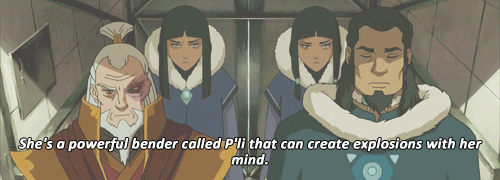
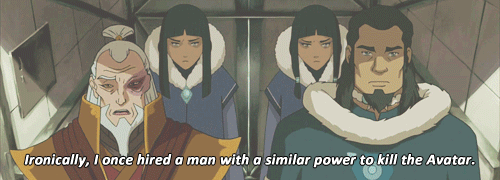
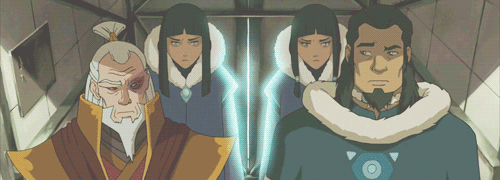
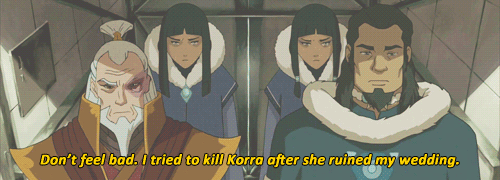
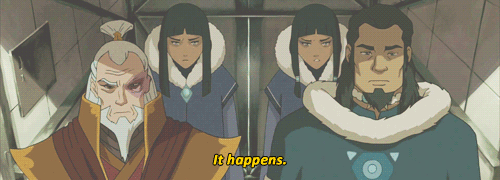
(source)
Oh, and is that Korra's dad? Yikes, I didn't even notice him during the actual episode.
The familiar dome-hatted silhouettes of the Dai Li poised at each end of the alleyway sent a shiver down my spine; a vivid reminder that Aang may have saved the world, but that the evil inherent in humankind is never fully eradicated.
Despite my initial disappointment in the portrayal of an Earth Queen as a villain (or at least a highly unsympathetic individual), it’s interesting to note that all three subplots involve movement towards a significant female character: for Korra it is the Queen, for Bolin/Mako it’s their grandmother, and for Zuko it’s P’Li.
I’m salivating for Zuko to finally meet up with Korra face-to-face – and perhaps Tenzin as well. I wonder just how much those two know each other, and I’ll probably die of happiness if Tenzin turns into a gushing teenage fan-boy meeting up with the man he idolized in his youth.

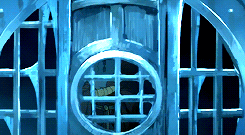
No comments:
Post a Comment